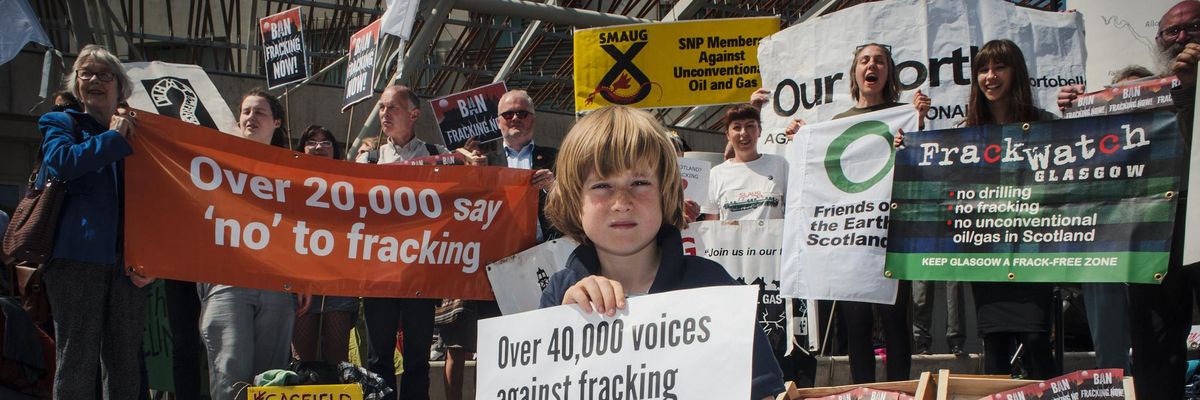Environmental groups from around the world applauded Scotland on Tuesday for its decision to ban fracking, following an overwhelming public outcry against the practice--and called for the United States and the rest of the United Kingdom to follow suit.
The Scottish government held a public comment period in recent months on fracking, attracting about 65,000 responses--the majority of which came from people in communities where the natural gas extraction would take place. An overwhelming 99 percent of Scots who participated were opposed to the practice.
"Banning fracking is a necessary step towards beating the worst effects of climate chaos, and the U.K. and the U.S. should follow Scotland's example."--Wenonah Hauter, Food & Water Watch
"Fracking will lead to an increase in pollution and the decimation of parts of the Scottish landscape and environment," wrote one respondent. "People will feel even more devalued as a result of having been ignored, communities wll be damaged by fracking wells and health will suffer as a result of noise, ground water contamination and probably indirect air pollution. Scotland can't afford to damage the health of its residents any more."
In addition to environmental concerns, many Scots said they weren't convinced of the potential economic benefits of fracking; the auditing firm KPMG found that it was likely to only increase the GDP by 0.1 percent. Others said relying on the risky method of energy production would signify a lack of innovation in the country.
"We should be moving to renewables. This is a backwards step," said a commenter.
Another added that the practice was "likely to be entirely detrimental as Scotland's international reputation as an innovator in design and engineering projects is undermined by our agreement to proceed with fracking...We have so much wind and wave power that it is retrograde in the extreme to lend any support to the fracking industry."
Food and Water Watch gave credit to the Scottish people for standing up to corporate entities that supported fracking. "Giant energy company Ineos, which invested heavily in its Scottish facility at Grangemouth, fought hard against this ban, even threatening to explore legal action against the government if it passed," said executive director Wenonah Hauter in a statement. "But people power prevailed, and it will continue to prevail. We can't let companies like ExxonMobil and Ineos stop the inevitable march towards clean energy. Bold and swift policy change is our only hope for addressing our climate goals. We applaud the Scottish government for doing what's right for people and the planet."
Scotland's decision leaves its neighbors, England and Wales, alone in their embrace of fracking.
"With all our nearest neighbours having banned or halted fracking, our government is increasingly out on a limb in pursuing it in England," said Rose Dickinson of Friends of the Earth.
Hauter also called on the U.K. as well as the U.S. to follow in Scotland's footsteps.
"Banning fracking is a necessary step towards beating the worst effects of climate chaos, and the U.K. and the U.S. should follow Scotland's example," she said. "In the U.S., we already have the means to start moving off of fracking swiftly--the Off Fossil Fuels For a Better Future Act, which would mandate a just transition to 100 percent clean renewable energy by 2035, starting with 80 percent within the next 10 years."
As in Scotland, public opinion in the UK and the US is not in fracking's favor, despite officials' insistence that the practice creates jobs and revenue. A poll by England's Business and Energy Department this summer found that only 16 percent of citizens support fracking, down from 21 percent last year.
In the U.S., opinions are more evenly split, but a 2016 Gallup poll found that 51 percent of Americans oppose fracking, while 36 percent support it.




